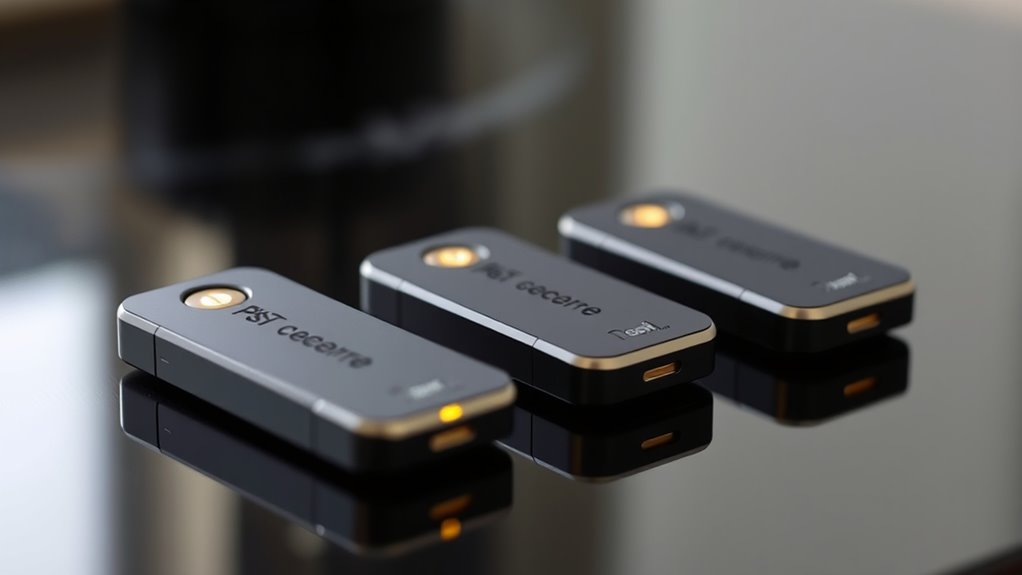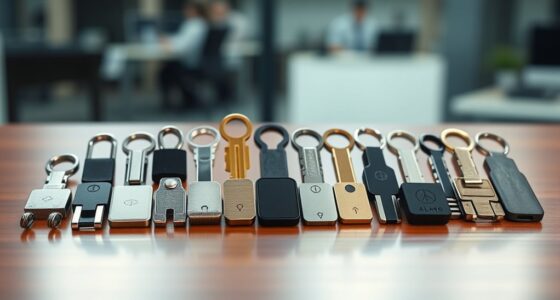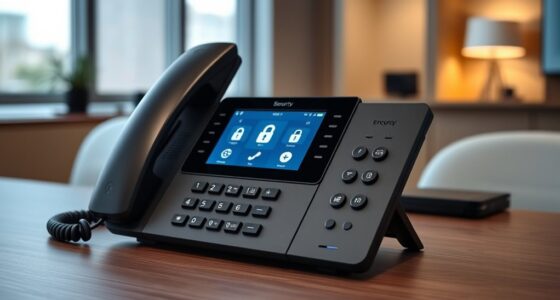In 2025, I trust the Password Keeper Wallet Organizer for offline password storage, the SecuX W10 crypto wallet for advanced cryptocurrency security, and a sturdy steel safe for valuable household items. These devices offer high security, compatibility, portability, and durability—essentials for safeguarding sensitive data. If you want to find out more about choosing the best hardware tokens for your needs, there’s plenty to explore that can keep your digital world protected.
Key Takeaways
- Prioritize hardware tokens supporting multiple protocols (FIDO2, U2F, OTP) for broad compatibility with password managers.
- Choose devices with high security features like secure elements, tamper resistance, and industry compliance.
- Opt for compact, battery-free tokens with easy-to-use interfaces for reliable daily authentication.
- Consider tokens with multi-platform support (Windows, macOS, Linux, mobile) to ensure versatile integration.
- Evaluate long-term durability and warranty to ensure trusted performance through 2025 and beyond.
Password Keeper Wallet Organizer (150 Codes)
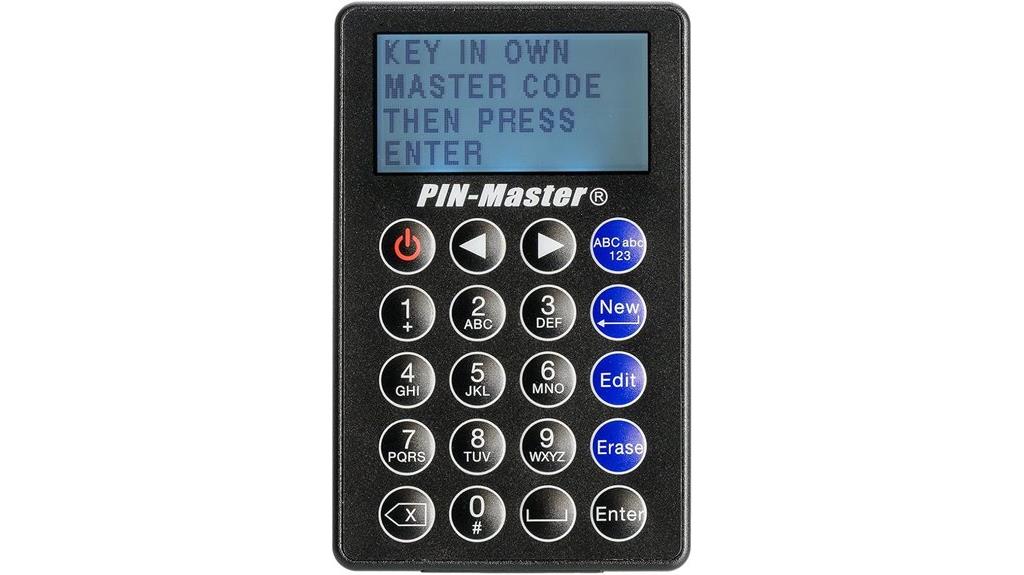
If you’re looking for a simple, reliable way to store up to 150 passwords offline, the Password Keeper Wallet Organizer is an excellent choice. This compact, credit card-sized device measures just 3.370 inches by 2.125 inches, fitting easily in your wallet or pocket. Made with durable metal alloy, it’s built to last. Its large, 4-line display makes viewing codes easy, and the ultra-slim design ensures portability. Access is protected by a single Master Code, and if entered incorrectly four times, all data is erased, keeping your passwords secure. Best of all, it guarantees your information offline, reducing hacking risks.
Best For: individuals seeking a simple, offline, and portable solution for securely storing up to 150 passwords in their wallet or pocket.
Pros:
- Compact, credit card-sized design fits easily in wallets or pockets for portability.
- Durable metal alloy construction ensures long-lasting use.
- Offline storage with a single Master Code enhances security and reduces hacking risks.
Cons:
- Limited to 150 password codes, which may not suit users with extensive password needs.
- No online backup option, so data recovery could be challenging if the device is lost or damaged.
- Basic interface may lack advanced features found in digital password managers.
SecuX W10 Crypto Wallet for Bitcoin, Ethereum, Ripple, Litecoin, Bitcoin Cash
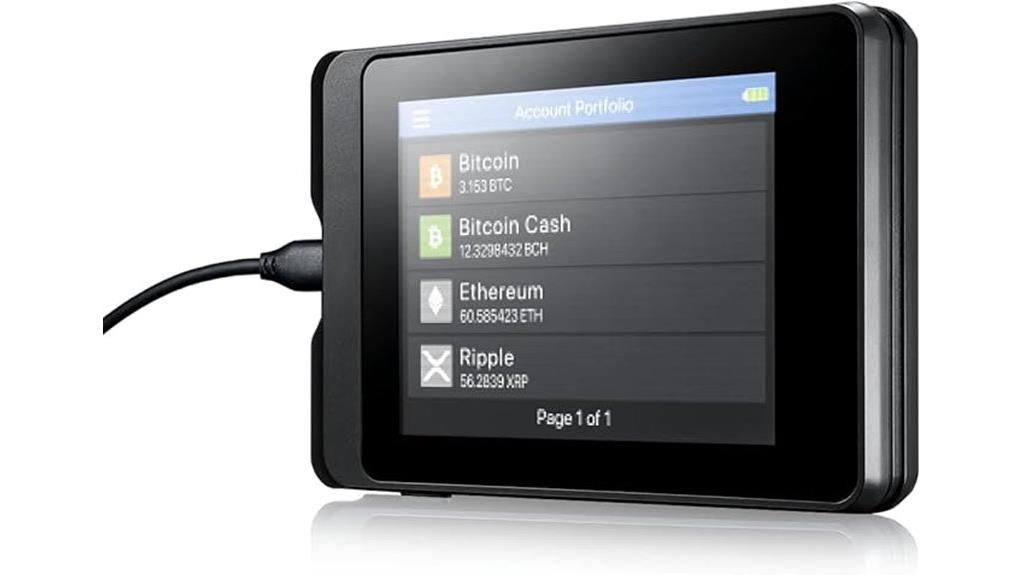
The SecuX W10 Crypto Wallet stands out as an ideal choice for serious cryptocurrency holders who prioritize security and versatility. It features a tamper-resistant packaging, a military-grade secure element, and a protected production chain to keep assets safe from threats and unauthorized access. Compatible with Windows, Mac, and Linux, it supports Bitcoin, Ethereum, Ripple, Litecoin, Bitcoin Cash, ERC-20 tokens, and more, with ongoing updates adding new coins. The 2.8-inch touchscreen makes navigation intuitive, with on-screen address verification protecting against malware redirection. Its streamlined design simplifies secure management, making it a reliable, future-proof hardware wallet for any serious crypto user.
Best For: serious cryptocurrency investors seeking a highly secure, versatile, and user-friendly hardware wallet compatible with multiple operating systems and a wide range of digital assets.
Pros:
- Comprehensive security features including tamper-resistant packaging and a military-grade secure element
- Supports a broad spectrum of cryptocurrencies and tokens with ongoing updates for future assets
- Intuitive 2.8-inch full-color touchscreen with on-screen address verification for enhanced usability
Cons:
- May be more expensive than basic wallets due to advanced security features
- Requires physical setup and firmware updates, which might be less convenient for some users
- Slightly larger form factor could be less portable compared to smaller hardware wallets
JCNAGXY Household Small Steel Password Coin-Operated Wall-Mounted Invisible Storage Car Safe
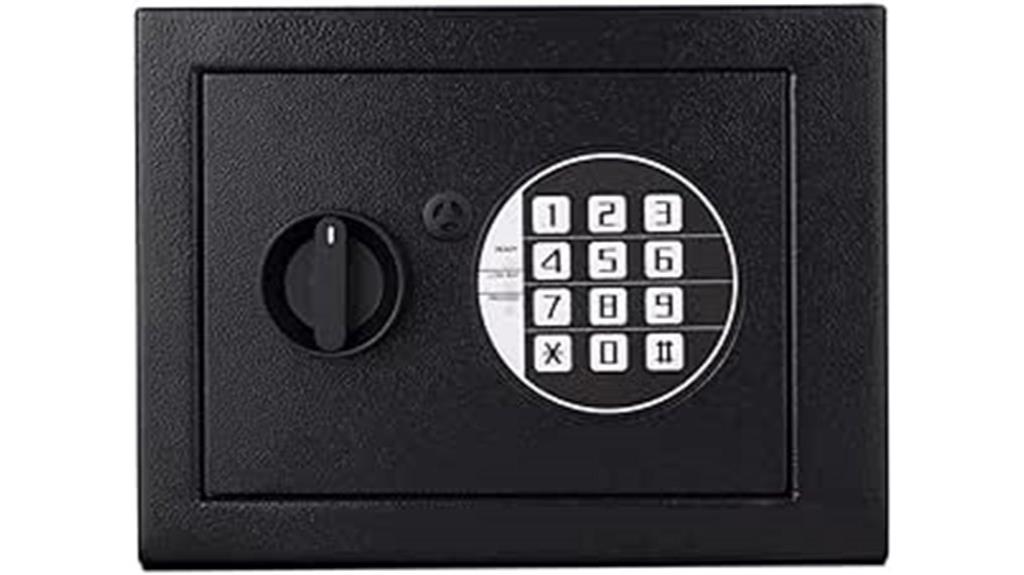
The JCNAGXY Household Small Steel Password Coin-Operated Wall-Mounted Storage Safe stands out for its robust all-steel construction and advanced security features, making it an excellent choice for those who need reliable, tamper-resistant storage. Its durable steel build offers impact resistance and enhanced anti-theft protection, while the 25mm solid locking bolt prevents saw attacks. The safe features optical fingerprint unlocking and touch-open functionality for quick access, with high sensitivity and recognition accuracy. Shallow phosphating treatment boosts corrosion resistance, ensuring long-term durability. Perfect for discreet household storage, this safe combines strength, technology, and convenience in a compact design.
Best For: individuals seeking a secure, durable, and discreet wall-mounted storage solution for valuables in their household.
Pros:
- All-steel construction provides excellent impact resistance and anti-theft protection
- Advanced access features like optical fingerprint unlocking and touch-open functionality for quick, secure entry
- Shallow phosphating treatment enhances corrosion resistance and long-term durability
Cons:
- Limited color options may not match all household decors
- Installation requires wall mounting, which might not be suitable for all wall types
- The small size may restrict storage capacity for larger items
Factors to Consider When Choosing Password Manager Hardware Tokens

When choosing a password manager hardware token, I consider factors like security level, device compatibility, and portability. I want a device that’s easy to use, reliable, and fits my lifestyle without hassle. Let’s explore these key points to help you pick the best option.
Security Level Importance
Choosing a hardware token with a high security level is essential because it directly affects how well your credentials are protected from physical tampering and unauthorized access. Devices with advanced encryption and secure elements offer stronger safeguards than basic models, making it harder for attackers to breach your data. The security level also determines the device’s resilience to sophisticated attacks like side-channel analysis or microchip hacking. Multi-factor authentication features add an extra layer of protection, minimizing the risk of credential compromise. Additionally, selecting a token with a proven security track record and compliance with industry standards ensures your data remains secure and trustworthy. Investing in a high-security device provides peace of mind, knowing your sensitive information is well-guarded against evolving threats.
Device Compatibility Options
Ensuring your hardware token works smoothly with your devices requires checking its compatibility with your operating system, whether that’s Windows, macOS, Linux, or mobile platforms like Android and iOS. Make sure the device supports integration with your existing password manager or enterprise systems, such as LDAP or SAML, to streamline authentication. It’s also important to verify whether the token uses standard protocols like FIDO2, U2F, or OTP, which impact interoperability across platforms. Consider if the token can connect via multiple interfaces, such as USB, NFC, or Bluetooth, to accommodate different device types. Ultimately, confirm it supports the specific applications or services you’re securing, ensuring seamless compatibility without unnecessary hurdles. This thorough check helps you choose a device that fits your tech environment perfectly.
Portability and Size
Since portability is key for frequent access on the go, hardware tokens are designed to be compact and lightweight, making them easy to carry in a pocket or wallet. They typically range from credit card-sized to small keychain forms, ensuring convenience without bulk. A slim profile and durable construction, like metal alloys, enhance their resistance to damage during daily use. The size of the token directly impacts user convenience, especially for those managing multiple accounts regularly. Small, lightweight devices allow quick and secure access to authentication codes without cumbersome equipment. When choosing a hardware token, I look for a balanced combination of size and sturdiness to ensure it fits seamlessly into my daily routine while withstanding the rigors of everyday carry.
Battery and Power Needs
Many hardware tokens operate without batteries, relying on a secure element or physical actions like pressing a button to generate authentication codes. This design means they don’t need charging or battery replacements, making them low-maintenance and reliable. However, some advanced tokens include rechargeable batteries to power display screens or extra features. These require regular recharging, which can be inconvenient if the device is used frequently or in remote locations. Battery life varies widely—some devices last years without replacement, while others need more frequent charging. Devices dependent on batteries must be easy to access for replacements or recharging to ensure uninterrupted security. When choosing a token, consider how power needs might affect your daily use and whether the device’s power source aligns with your routine for convenience and dependability.
Ease of Use Features
When selecting a hardware token, ease of use plays a crucial role in guaranteeing reliable security without frustration. A straightforward interface, like large buttons or a clear display, helps you authenticate quickly and confidently. Devices with minimal setup steps and intuitive navigation reduce user errors and make the process smoother. Features such as a single master code or simple PIN entry streamline access, avoiding complex procedures. Visual cues like LED indicators or screen prompts can guide you through authentication seamlessly, preventing confusion. Compatibility with common operating systems and clear instructions are essential for a broad user base, making setup and daily use hassle-free. Prioritizing these ease of use features ensures your security measures are effective without sacrificing convenience.
Price and Value
Choosing the right hardware token involves balancing cost and security to get the best value. Prices range from $20 to $100, depending on features like biometric support or multi-factor authentication. Investing in a more expensive token often means better security, longer lifespan, and easier integration with other tools. When evaluating value, consider the cost per year, factoring in durability and warranty coverage. Cheaper tokens might save money upfront but could lack advanced protections, risking sensitive data. Higher-priced options usually include extra features that justify the cost, especially if they enhance security. Ultimately, finding the right balance means appraising your needs against the token’s features and longevity, ensuring you get reliable protection without overspending. This way, you maximize both security and value.
Frequently Asked Questions
Are Hardware Tokens Immune to Phishing Attacks?
Hardware tokens are generally more resistant to phishing attacks because they require physical possession and often involve one-time codes or cryptographic keys. However, they’re not completely immune—if someone steals or clones your token, they could bypass protections. So, while they considerably reduce phishing risks, it is crucial to keep your tokens secure and remain vigilant against social engineering tactics.
How Often Should I Replace My Hardware Token?
I recommend replacing your hardware token every few years, just like you’d refresh a trusty gadget before it feels outdated. This keeps security sharp and guarantees it’s not lingering past its prime. While these devices are built to last, technological advances and potential wear and tear mean it’s wise to stay ahead of any issues. Regular updates help keep your accounts safe and your peace of mind intact.
Can Hardware Tokens Be Used for Multi-Factor Authentication?
Yes, hardware tokens can definitely be used for multi-factor authentication. I use mine to add an extra layer of security when logging into sensitive accounts. They work alongside passwords, requiring physical possession for access, which makes hacking much harder. I find them reliable and convenient, especially for work or personal accounts that need strong protection. If you’re serious about security, I highly recommend using hardware tokens as part of your multi-factor authentication setup.
What Is the Lifespan of a Typical Hardware Password Token?
A typical hardware password token lasts about 3 to 5 years. Think of it like a durable marathon runner—designed to keep going strong for many miles, but eventually needing rest and replacement. I’ve seen colleagues replace theirs after a few years, especially when updates or security vulnerabilities arise. Proper care and regular updates can extend its lifespan, but planning for eventual replacement guarantees your security stays intact.
Are There Eco-Friendly or Recyclable Hardware Token Options Available?
Yes, there are eco-friendly and recyclable hardware tokens available. I’ve seen options made from biodegradable materials or designed for easy disassembly and recycling. Some companies focus on sustainability by using recycled plastics or offering programs to return and refurbish tokens. If you’re environmentally conscious, I recommend researching brands committed to eco-friendly practices, ensuring your security measures align with your sustainability values without sacrificing performance or safety.
Conclusion
Choosing the right hardware token feels like locking away a treasure chest—secure, reliable, and ready when you need it most. Trusting these top options in 2025 means I can rest easy knowing my passwords are guarded by advanced tech, like a fortress protecting priceless gems. Think of it as having a personal security guard for your digital life—unseen but unwavering, ensuring your data stays safe no matter what.
